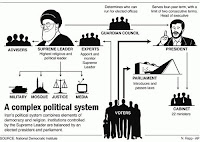Getting the facts straight!
Everyone is entitled to his own opinion, but not his
own facts. (late Sen. Daniel Patrick Moynihan)
On May 26, the editors of The Washington Post claimed that Iran has “no right” under the Nuclear Non-Proliferation Treaty (NPT) to process uranium. In a letter to the editor published by the Post on June 2, Alireza Miryousefi of Iran’s mission to the UN wrote that the Post was simply wrong on that key point.
The Iranian diplomat seemed to be quoting from the NPT in saying that it unambiguously recognized “the inalienable right of all of the parties to the treaty to develop research, production, and use of nuclear energy for peaceful purposes without discrimination.” It turns out that it is word-for-word from the treaty text. “Peaceful purposes” would include fueling nuclear power plants to generate electricity. But why, some ask, would Iran need those when it has so much oil and natural gas? President Gerald Ford asked that same question in 1976, before he was persuaded to approve a deal with the shah of Iran, under which Westinghouse and General Electric were to make billions of dollars by supplying essentially the same full nuclear-fuel-cycle capability to Iran that Tehran now claims the right to create on its own.
Ford’s principal aides, Donald Rumsfeld and Dick Cheney, reminded the president that Iran’s demand for electrical power would inevitably increase and that its oil and gas resources would be depleted one day. In the interim, they explained, Iran coveted the hard currency it earns from selling its gas and oil on the international market.
The deal fell apart when the shah fell from power. That this history is not widely known has made it easier for some U.S. and Israeli officials and pundits to argue that that the primary aim of Iran’s nuclear development program must be to build nuclear weapons. For those hoping to stir up a crisis with Iran, it’s helpful to shove down the memory hole that Rumsfeld and Cheney once advocated Iran having a nuclear program.
Part of the problem (not to mention the confusion) lies in the fact that the uranium enrichment technology used for power plants can also be used to create a nuclear weapon, assuming it is refined to a much higher purity. And the prospect of a nuclear-weapon-capable Iran is widely considered a frightening prospect in view of Iran’s supposed threat to “wipe Israel off the map.” President Obama himself alluded to this in his March 4 address before AIPAC. But a fact-checking problem is that no senior Iranian official has threatened to “wipe Israel off the map.” Israeli Deputy Prime Minister, Dan Meridor, who is also Israel’s minister of intelligence and atomic energy, reluctantly conceded the point during an interview with Al Jazeera on April 14. Meridor agreed that Iranian leaders “didn’t say, ‘We’ll wipe Israel out.’”
But, still, “everyone knows” that Iran is secretly working on a nuclear weapon. The trouble there is that Defense Secretary Leon Panetta stated definitively on Jan. 8 that Iran is not doing that; and 10 days later his Israeli counterpart, Ehud Barak, agreed. According to the official U.S. government translation of Barak’s interview on Jan. 18 with Razi Barkay of Israeli Army Radio, Barak stated that Iran “is evidently not trying to procure nuclear weapons.” (With thanks to R.McGovern)




Comments